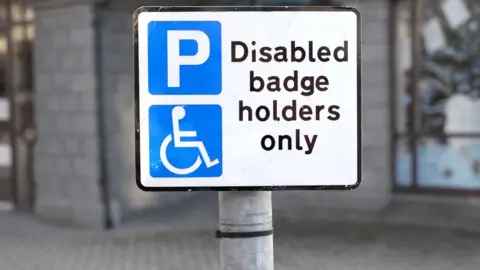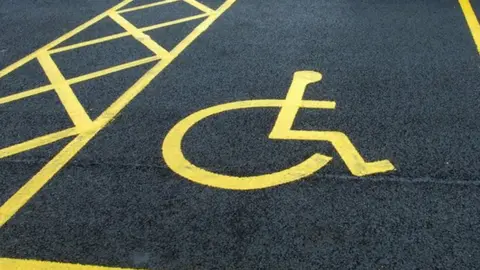Parking permits for disabled people: 'Inconsistency needs to end'
 Getty Images
Getty ImagesDisabled people in Wales face "inconsistent" management of blue badges depending where they live, according to an assembly committee.
Some councils use specialist occupational therapists to assess applicants while others rely on assessments undertaken by lay staff.
Cancer charity Tenovus said some would accept letters from GPs or nurses, but others would not.
AMs also found renewing blue badges can be difficult and potentially invasive.
Guidance issued to local authorities is not legally binding, meaning the 22 councils have different ways of administering the scheme.
The report calls for guidance to local authorities on blue badge permits, which help disabled people to access goods and services by allowing them to park close to their destination, to be statutory.
 PA / Sean Dempsey
PA / Sean Dempsey'Trauma and hassle'
Father-of-two Peter Russ, 49, from Pembrokeshire, suggested blue badges holders with life-long conditions should not have to reapply for permits as often.
His 22-year-old son, Connor, uses a wheelchair after being born with a chromosomal abnormality which has caused health problems including cerebral palsy and epilepsy.
The family have to take him to Pembrokeshire council offices to renew the permit every three years where he is photographed for the parking badge issued in his name.
"It would save a lot of trauma and hassle," said Mr Russ.
"I'm not having a go at the staff. But it is a lot of work.
"It should be like a driving licence where the badge lasts for 10 years for people with certain conditions."

Rhian Davies, chief executive of Disability Wales, told the Jason Mohammad programme on BBC Radio Wales it was "very confusing" for people because different councils had different policies and processes when people applied for a badge.
Tina Sharp, from Knighton in Powys, who contributed to the committee's inquiry, also said it was "really difficult" for people to apply for blue badges.
The 55-year-old has used a wheelchair for the past 15 years as she has Arnold-Chiari malformation which affects brain and spinal cord development.
She also had to apply for a blue badge for her father because he "wouldn't have known where to start" which would have left him "house-bound".
Ms Sharp said many people use libraries to seek help to make their application, but 10 libraries in Powys are under threat of closure.
"There is no real information out there. People need to be made more aware of where to apply.
"When it comes to parking where I am on the border, you don't know what parking is for the disabled or not, or if we pay," she added.
Cancer charity Tenovus told the AMs: "Some [councils] insist on clients making an appointment to complete an application, other areas allow our CSAs [Cancer Support Advisors] to send in an application on a client's behalf.
"Some have paper based applications available online, others don't. Some insist on assessments, others don't.
"Some accept covering letters from CNSs [clinical nurse specialists], others don't. Some accept covering letters from GPs, others don't."
There is no formal way of appealing against a blue badge decision, but the Equality, Local Government and Communities committee found people can reapply with further information.
But it said often this information is either confusing or not made available at all.
It also found while those who are automatically entitled to a blue badge do not need to re-apply, those who require further assessment - including people with degenerative conditions such as Alzheimer's disease - even where the condition is life-long.
Committee chairman John Griffiths said: "Blue badges provide a lifeline for a range of people in our society.
"Without them many would struggle to access essential services such as attending medical appointments.
"Difficulty in visiting shops and using leisure facilities diminishes their ability to lead independent lives and they could become more isolated and confined to their own homes."
The committee recommended establishing a statutory working group for the scheme which meets regularly and includes people with lived experiences of the scheme.
It also wants a process in place to enable people with a life-long or deteriorating condition to renew automatically, and for there to be a process for applicants wishing to challenge a decision to follow.
A spokesperson from the Welsh Government said: "We welcome this review and the opportunity to give evidence. We will consider the findings and respond in due course."
The Welsh Local Government Association, which represents the 22 Welsh councils, also welcomed the assembly's findings.
An official added: "Local authorities recognise that there is scope to improve the Blue Badge scheme and a practitioners' workshop had already been arranged for the early autumn to consider improvements and share good practice."
